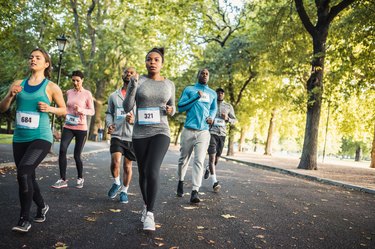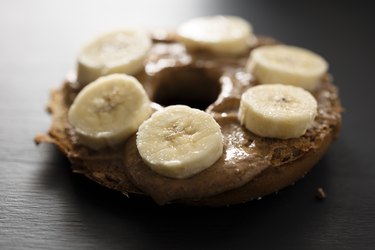
Completing the 26.2 miles of a marathon is an incredible achievement, and the thousands of steps taken while training for and running such a long race will cause your body to make many adjustments.
Your oxygen demands will increase during the long run, meaning that your heart rate, breathing and circulation will all increase as well, as described in the March 2016 issue of the journal Breathe.
Video of the Day
Video of the Day
Weight loss — due to both fluid loss and calorie burn — can also result. As a marathoner, you'll burn through lots of calories while running the 26.2 mile course. How many, exactly? Well, it depends.
A Note on Language
Here at LIVESTRONG.com, we carefully consider language surrounding sex and gender. We typically avoid language that implies a sex or gender binary in favor of neutral language, such as "assigned female at birth" (AFAB) and "assigned male at birth" (AMAB). We use "gender" when referring to a person's social identity; we use "sex" when referring to biological characteristics.
Most exercise research still categorizes people as men or women, so we're using those terms where they are used by primary sources throughout this article.
Factors Affecting Calorie Burn
The number of calories you burn — and therefore the amount of weight you lose — while running a marathon is dependent upon a number of factors. These include:
1. Gender
"Men usually have less body fat and more muscle than do women of the same age and weight, which means men burn more calories," notes the Mayo Clinic.
In other words, male runners typically require more energy for physical exertion than their female counterparts, because men usually have more body mass. That results in a higher calorie burn — and therefore, more weight loss — during the race.
2. Age
Older runners typically have a slower resting metabolic rate, meaning they burn fewer calories during exercise. As you age, your muscle mass usually decreases "and fat accounts for more of your weight, slowing down calorie burning," according to the Mayo Clinic.
3. Body Weight
As a runner, you'll burn more calories per hour if you weigh 210 pounds than if you weigh 125. A 125-pound person who runs for 30 minutes at 5 mph (a 12-minute mile) will burn 240 calories, while a person who weighs 155 will burn 288 calories running at that same speed — and a 185-pound person will burn 336, according to Harvard Health Publishing.
4. Basal Metabolic Rate
Regardless of any of the above factors, some runners naturally have a faster metabolism than others. As a result, they will burn more calories — and potentially lose more weight — during a marathon.
Metabolism is the process by which calories and oxygen are converted into energy, according to the Mayo Clinic. Health conditions such as hypothyroidism slow down that process.
5. Race-Day Environment
Altitude, sun exposure, wind, humidity and temperature can all affect how many calories you burn during a marathon. If race day is sunny, hot and humid, your internal body temperature will be higher, boosting your basal metabolic rate and increasing your calorie burn.
Likewise, if you run at a high altitude or against the wind, your body will have to work harder. The result: a higher calorie burn. (FYI: While you'll burn more calories running outside than you will on a totally flat treadmill, you can set your treadmill's incline to 1 percent to match logging miles outdoors, according to a landmark January 1996 article in the Journal of Sports Sciences.)
Tip
Doing a few sweat-rate tests before the marathon can help you figure out how much liquid you'll need to drink hourly during the race to avoid dehydration (or overhydration), according to the Denver Colfax Marathon Partnership. Weigh yourself before and after a 1-hour training run, note the weight lost and the fluid consumed (in ounces), then hydrate accordingly going forward.
6. Mid-Race Fluid Intake
During the race, you will stop at various aid stations to drink water, sports drinks and electrolyte supplements. The amount and type of fluid you drink during the race can influence how many calories you burn and how much weight you lose during the marathon.
A general rule of thumb for marathoners is to consume 15 to 36 ounces of fluid per hour to maintain hydration levels, "although this is often difficult to accomplish and can result in overhydration if your sweat loss is low, " according to he University of California, San Francisco.
Drinking more fluid than you need could add extra calories, possibly resulting in overall weight gain during the race. Drinking less than you need could lead to excessive mid-race weight loss, decreased performance and, potentially, unhealthy medical conditions such as dehydration, cramping or heat stroke.
7. Running Pace
Increasing your running pace will make you burn more calories. A 155-pound runner who averages 5 mph burns 288 calories every half hour, while a runner of the same weight who runs a faster 7.5 mph burns 450 — and a 155-pound runner who does a 6-minute mile burns 562, per Harvard.
Faster runners, therefore, might lose more weight during a marathon. To lose 1 pound, you have to burn 3,500 more calories than you take in, according to the U.S. Department of Agriculture (USDA).
Related Reading
Marathoner Nutrition
Exercise and physical training are important aspects of marathon running, but nutrition is also a key factor. Before, during and after a long race like a marathon, you must make sure that your energy intake and output are adequately balanced, that you are properly hydrated and that you are eating a variety of healthy foods.
Because nutritional needs and energy demands are high during long runs, marathon runners should strive to eat a balanced, nutritious diet in order to improve performance and endurance during the race.
You start eating additional complex carbohydrates two weeks before the big run, according to the Cleveland Clinic; by the time the marathon is three days away, "complex carbohydrates should make up about 70 percent of your diet, fat 20 percent and protein 10 percent."
A race-day breakfast of 800 to 1,200 calories will help your energy last during the race, according to the Cleveland Clinic.
If Running Your First Marathon Feels Daunting, Start Here
- Breathe: "Your Lungs and Exercise"
- Cleveland Clinic: "What to Eat When You're Training for a Marathon"
- USDA: "I Want to Lose a Pound of Weight — How Many Calories Do I Need to Burn?"
- Harvard Health Publishing: "Calories Burned in 30-Minute Activities"
- Denver Colfax Marathon Partnership: "Sweat Rate Testing — How Much Fluid Do You Need During a Marathon?"
- University of California San Francisco: "Running a Marathon — Race Day Success"
- Mayo Clinic: "Weight Loss"
- Journal of Sports Sciences: "A 1% treadmill grade most accurately reflects the energetic cost of outdoor running"


